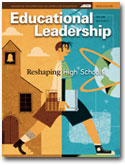May 1, 2008
•
5 min (est.)•
Vol. 65•
No. 8Ask About Accountability / Timed Tests for Tykes?
Question: Each week, our school requires all 1st and 2nd graders to take timed tests in basic mathematics. The announced purpose of this activity is to improve students' standardized test scores by the time those statewide tests are administered in 3rd grade and beyond. Although the tests take less than five minutes to complete, the pressure on students to perform satisfactorily is palpable. "Perfect-score students" receive rewards recognizing their accomplishments. Parents of low-scoring students are urged to help their children with their math skills at home. I believe my school is moving in a direction detrimental to children's learning. Do you agree?
Answer: Yes, your school is moving in the wrong direction. Sadly, what you've described is symptomatic of the way many educators are currently allowing students' scores on external tests to trump almost everything going on in school. What's most troubling about your school's "timed-tests-for-tots" policy is that it corrupts an education tool that, if used properly, can markedly enhance education quality. I refer, of course, to tests.
Let's consider for a moment why educators use tests in the first place. We assess students so we can make inferences about students' covert knowledge, skills, and affect. Teachers can't tell—by looking—how much a student knows about world history, whether a student can design a sensible scientific experiment, or what a student's attitude is toward mathematics or reading. That's why teachers use tests (or, if you prefer, assessments) to get a fix on what kids know, can do, or believe. Without tests, educators would only be able to speculate about what's going on inside their students' skulls.
Tests, however, oblige students to perform in a way that yields an overt response. Students might circle a T or F for a true-false item or make checkmarks on an attitudinal inventory. From these overt responses, educators make inferences about their students' covert status. Teachers who don't assess their students, either formally or informally, end up guessing about their students' status. They'll often guess wrong.
Tests, then, should be a teacher's ally because they enable teachers to get an accurate fix on their students. If teachers employ tests as part of a formative assessment process, then the instructional dividends really roll in. Substantial evidence indicates that classroom formative assessment, if appropriately implemented, can produce remarkable gains in students' learning. These gains arise when teachers employ assessment-elicited evidence to adjust how they're teaching or to help students adjust how they're trying to learn something.
And tests—if they have been properly selected for that purpose—can also supply evidence that can be used to evaluate schools or school districts. Although many standardized accountability tests used today in the United States are ill suited for such evaluative purposes, the right kinds of external achievement tests can supply relevant evidence regarding the quality of instruction. Thus, whether they're used for instructional or accountability purposes, tests represent potentially potent tools for teachers.
This brings us back to what's been going on in your school—forcing 1st and 2nd graders to take short-duration timed tests. Clearly such timed test taking will not be useful for children when they grow up. When was the last time you had to take a timed test?
Why, then, are these youngsters being required to take timed tests in math each week? The answer is all too apparent: So the adults running the school will look good. School administrators or district officials have decided that when federally required accountability tests arrive during 3rd grade, the school's students will perform well on those tests, making it appear as though the school is effectively teaching its students.
Given the fact that so many young people regard math with distaste these days, the last thing educators should do is pressure kids to be math-perfect in minutes. I'm assuming that these tests start off with addition and subtraction, but one never knows when this sort of practice-test insanity infects a school's leadership. We need our students to regard mathematics positively, to realize that the basic operations in math are not only important, but also readily mastered. How can we nurture such dispositions toward math when each week a test shows many of the school's students that they're "not very good at math"? Moreover, the numerous rewards dished out to the perfect-score students will surely make the other students feel decisively "imperfect" at math.
What's going on in your school is educationally indefensible. Your school's officials have taken a terrific instructional tool—a test of students' math understanding—and transformed it into a whip. Many of the students will probably end up disliking not only tests, but also math.
In an instructionally oriented classroom, teachers and students would see assessments as helpful tools. However, the weekly tests that your 1st and 2nd graders are taking while a stopwatch ticks are anything but helpful. Your school's administrators should abandon this absurdity altogether and, instead, urge teachers to teach math well.
